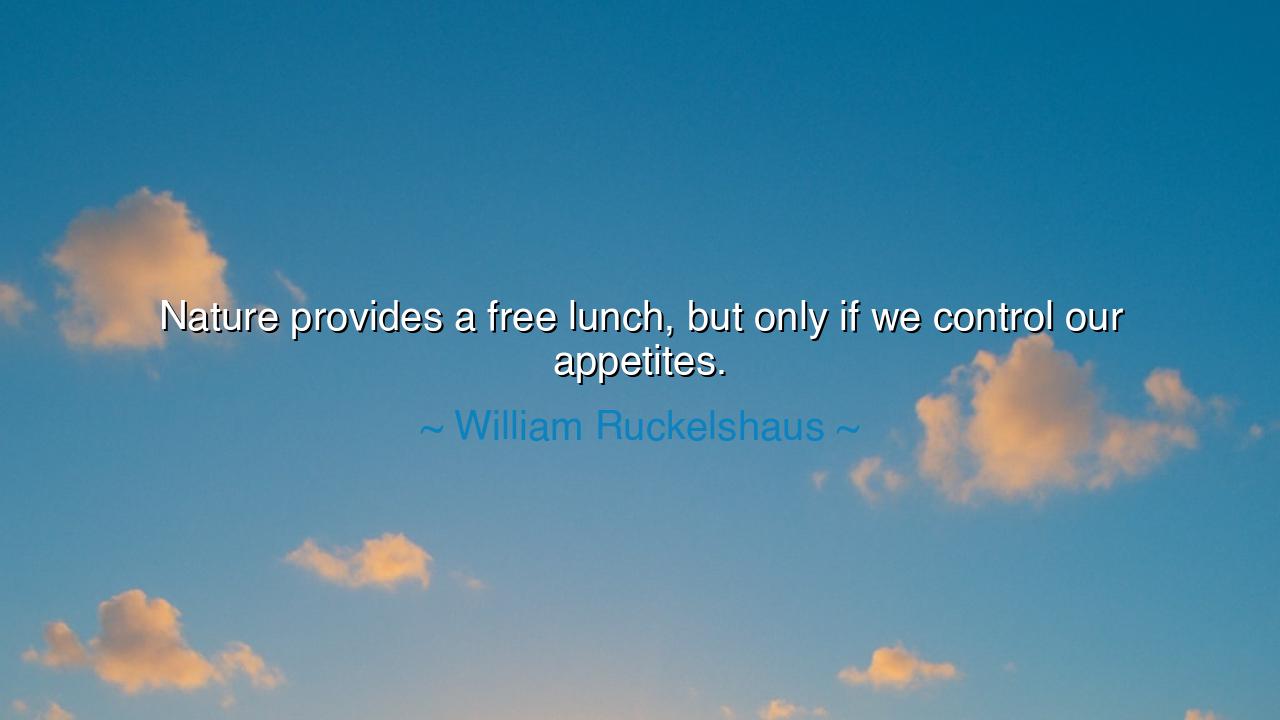
Nature provides a free lunch, but only if we control our






In the words of William Ruckelshaus, the first administrator of the United States Environmental Protection Agency, there is a warning and a hope intertwined: “Nature provides a free lunch, but only if we control our appetites.” This saying, though simple, speaks with the weight of centuries. It tells us that the earth is generous, overflowing with gifts that sustain life, yet its generosity is not without limits. If man consumes without restraint, the feast becomes famine; but if he governs his hunger with wisdom, nature’s bounty will endure for generations.
To call nature’s gifts a “free lunch” is to recognize their abundance. The rivers flow, the soil yields, the forests shelter, the seas provide. None of these require payment, for they are offered freely to all creatures beneath the sun. Yet the phrase carries a paradox, for while they cost no coin, they demand reverence. The condition is hidden in the second half of the saying: only those who control their appetites will continue to enjoy this feast. Excess, greed, and disregard poison the banquet, and the table collapses under human folly.
History offers many examples of this truth. Consider Easter Island, once a place of towering forests and thriving people. But the trees were felled without restraint, the land stripped for idols and fuel, until the island was barren and the people starved. Here, nature gave her gifts freely, but the people failed to govern their appetites. The result was ruin. Contrast this with the ancient Incas, who carefully managed their terraces and water, taking from the land with discipline, ensuring that their mountains yielded crops for centuries. In this balance of hunger and restraint lies the wisdom Ruckelshaus speaks of.
This lesson is not confined to distant times. In our own age, the seas are overfished, forests cut at a pace faster than they can regrow, and the air filled with smoke. We consume as though the earth were infinite, forgetting that even a free gift can be squandered. Ruckelshaus, as guardian of the environment, saw this clearly: man’s greatest danger is not nature’s scarcity, but his own insatiable appetite. The danger is not in nature’s silence, but in our deafness to her warning cries.
Yet there is also hope in his words. If we can govern our hunger, then the “free lunch” remains. Nature, unlike a miser, is generous beyond measure when treated with respect. The soil replenishes, the forests regrow, the seas heal, and the air clears when given time. Humanity is not doomed to destruction, but invited to partnership. The feast can continue if we approach the table not as plunderers, but as grateful guests.
The deeper meaning of this teaching is that discipline is the key to abundance. Just as the wise man prospers by saving while the foolish man perishes by squandering, so too does mankind flourish when it tempers its consumption. The secret to lasting wealth is not excess, but moderation. The true test is not how much nature gives, but how much we take without thought.
Let us take from this a lesson for daily life. Be mindful of what you consume—food, water, energy—and remember that each act of restraint is an offering back to the earth. Support those who farm, fish, and build with respect for the land. Teach children gratitude for the gifts of nature, so they may inherit not ashes, but abundance. Above all, cultivate humility, for man is not master of the feast, but one guest among many.
Thus the words of Ruckelshaus endure: “Nature provides a free lunch, but only if we control our appetites.” Let them echo as a commandment for our age: eat from the earth with gratitude, take with moderation, and leave enough for those who come after. In this discipline lies the secret of prosperity, and in this reverence lies the possibility of survival. For the banquet of life is endless, if only we learn to feast with wisdom.






AAdministratorAdministrator
Welcome, honored guests. Please leave a comment, we will respond soon